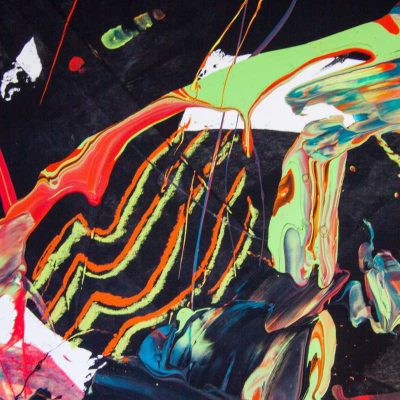Candide and his servant were beyond the barriers, and no one yet knew in the camp the death of the German Jesuit. The vigilant Cacambo had taken care to fill his suitcase with bread, chocolate, ham, fruit, and some measurements of wine. They sank with their Andalusian horses into an unknown country where they did not discover any road. At length a fine meadow interspersed with streams appeared before them. Our two travelers have their mounts repaired. Cacambo proposes to his master to eat, and gives him an example.
“How do you want,” asked Candide, “that I eat ham, when I have killed Baron’s son, and when I am condemned to see no more the beautiful Cunegonde of my life? What will it be for me to prolong my miserable days, since I must drag them away from her in remorse and despair? And what will the Journal de Trevoux say?”
In speaking thus, he did not leave to eat. The sun was setting. The two astray heard a few little cries which seemed pushed by women. They did not know whether these cries were pain or joy; but they rose precipitately with that anxiety and alarm which all inspires in an unknown country. These clamors started from two naked girls running lightly along the prairie, while two monkeys followed them, biting their buttocks. Candide was touched with pity; he had learned to shoot among the Bulgarians, and he would have killed a hazelnut in a bush without touching the leaves. He takes his Spanish rifle with two shots, shoots, and kills the two monkeys.
“God be praised, my dear Cacambo! I have delivered these two poor creatures from great peril. If I have committed a sin by killing an inquisitor and a Jesuit, I have repaired it very well by saving two daughters. They are perhaps two young ladies of condition, and this adventure can afford us great advantages in the country.”
He was about to go on, but his tongue became perturbed when he saw the two girls tenderly kissing the two monkeys, bursting into tears on their bodies, and filling the air with the most painful cries.
“I did not expect such goodness of soul,” he said at last to Cacambo; who replied,
“You have made a fine masterpiece there, my master; you killed the two lovers of these young ladies.”
“Their lovers! could it be possible? You make fun of me, Cacambo; why to believe you?”
“My dear master,” replied Cacambo, “you are always astonished at everything; why do you think so strange that in some countries there are monkeys that get ladies good graces? They are quarters of man, as I am a quarter of a Spaniard.”
“Alas!” replied Candide, “I remember having heard Master Pangloss say that such accidents had happened before, and that these mixtures had produced Egyptians, fauns, and satyrs; which several great personages of antiquity had seen; but I took that for fables.”
“You must be convinced now,” said Cacambo, “that it is a truth, and you see how it is used by persons who have not received a certain education; all I fear is that these ladies will do us some harm.”
These strong reflections induced Candide to leave the meadow, and plunge into a wood. He supped there with Cacambo; And after having cursed the inquisitor of Portugal, the governor of Buenos Ayres, and the Baron, fell asleep on moss. When they awoke, they felt that they could not move; the reason was that during the night the Mumps, inhabitants of the country, to whom the two ladies had denounced them, had bound them with ropes of bark.
They were surrounded by about fifty naked Mumps, armed with arrows, clubs, and axes of pebble; some boiled a large boiler; others prepared pins, and all cried out:
“He is a Jesuit, he is a Jesuit! We shall be avenged, and we shall make good dear; let’s eat Jesuit, let’s eat Jesuit!”
“I told you so, my dear master,” cried Cacambo sadly, “that these two girls would play us a bad turn.”
Candide perceiving the boiler and the pins cried:
“We will certainly be roasted or boiled. Ah! What would Master Pangloss say if he saw how pure nature is made? All is well; but I confess that it is very cruel, to have lost Miss Cunegonde, and to be put on the spit by Mumps.”
Cacambo never lost his head.
“Do not despair from nothing,” he said to the desolate Candide; “I hear a little the jargon of these people, I will speak to them.”
“Do not fail,” said Candide, “to represent to them the frightful inhumanity of cooking men, and how little Christianity it is.”
“Gentlemen,” said Cacambo, “you intend, then, to eat a Jesuit today? It’s very well done; nothing is more just than to treat your enemies thus. Indeed natural law teaches us to kill our neighbor, and so it is that we act in all the earth. If we do not use the right to eat it, it is because we have good enough to make good food; but you do not have the same resources as we do; it is certainly better to eat his enemies than to abandon to the ravens and crows the fruit of your victory. But, gentlemen, you would not want to eat your friends. You think you’re going to put a Jesuit on a spit, and he is your defender, the enemy of your enemies that you’re going to roast. For me, I was born in your country; Sir, whom you see is my master, and far from being a Jesuit, he has just killed a Jesuit; that is the subject of your mistake. To verify what I tell you, take her dress, take her to the first barrier of the kingdom of the padres; inquire whether my master has not killed a Jesuit officer. It will take you a little time; you can always eat us if you find I lied to you. But if I have told you the truth, you know too well the principles of public law, morals, and laws, in order not to give us pardon.”
The Mumps found this discourse very reasonable; they deputed two notables to go in diligence to inquire into the truth; the two deputies discharged their commission as men of intelligence, and soon returned to bring good news. The Mumps released their two prisoners, gave them all kinds of civilities, offered them daughters, gave them refreshments, and led them back to the confines of their states, shouting with joy:
“He is not at all a Jesuit, he is not at all a Jesuit!”
Candide never tired of admiring the subject of his deliverance.
“What a people! he said, “What men! What morals! If I had not had the good fortune to give a great blow of a sword through the body of Miss Cunegonde’s brother, I was eaten without remission. But, after all, pure nature is good, since these people, instead of eating me, have done me a thousand honors, as soon as they knew that I was not a Jesuit.”











Leave a Reply